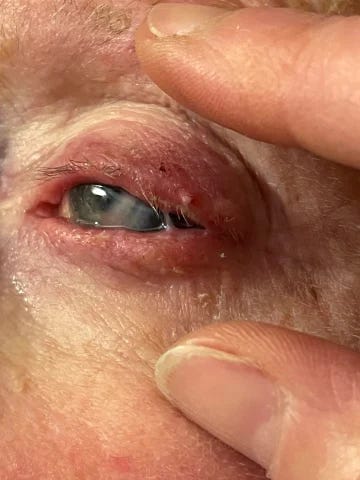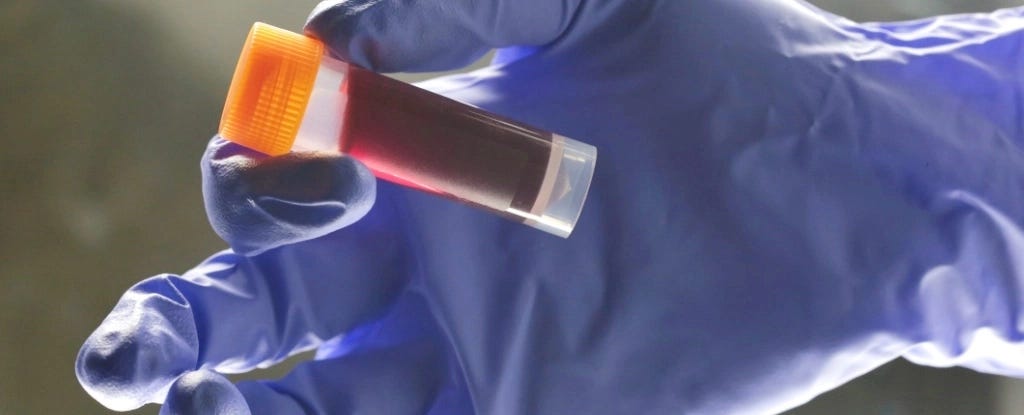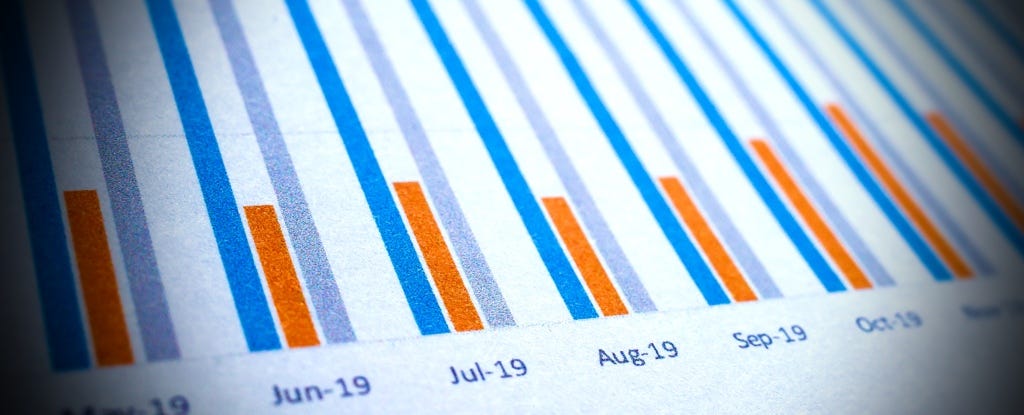Sci-Ed Update 250
Cannabis cream for muscle aches, more on the eyedrop fiasco, and (of course) the ChatGPT fiasco, does blood type affect stroke risk?—and a lot more stories.
Note: In the Sci-Ed Update 249 the “Read more→” link was missing for the article Artificial skin helps reveal details about how skin cancer develops. The link has been added to the web version of #249 and is reproduced here:
Read more→ AandP.info/4mb
Doctors expect more infections from tainted eyedrops that have been recalled
Doctors worry that people are still using the two brands of over-the-counter eyedrops that may be contaminated with potentially deadly bacteria.
This photo of Judy Gregory's eye was taken in January, eight months after she was initially infected.Courtesy Kim Harrison
As of Wednesday, the artificial tears, manufactured in India by Global Pharma Healthcare, have been linked to at least 55 cases of antibiotic-resistant Pseudomonas infections nationwide. Cases so far have been reported in 12 states: California, Colorado, Connecticut, Florida, New Jersey, New Mexico, New York, Nevada, Texas, Utah, Washington and Wisconsin. The company has since recalled its products, also sold under the brand name Delsam Pharma.
One person has died and five other people have been blinded, at least in one eye, the CDC said. The agency first reported potential problems with the eyedrops on Jan. 20, but did not issue a public health alert on the matter until Feb. 1.
"This was a very complex investigation that required a number of techniques that are time consuming and challenging to coordinate and implement," a CDC spokesperson told NBC News. "Due to the widespread nature of this outbreak, the investigation required coordination and data collection from a large number of state and local health jurisdictions."
Read more→ AandP.info/jmf
Inside the post-ChatGPT scramble to create AI essay detectors
Edtech giants and plucky start-ups are vying to create potentially lucrative tools to combat the use of AI in assessments, but will they cause more problems than they solve?
…trying to detect academic writing generated by artificial intelligence (AI) poses an altogether different challenge, according to Dr Foltýnek.
“There is no source document to verify,” he explained. “The teacher cannot prove anything, and the student cannot defend themselves. The only thing the teacher knows is that this particular sentence or passage looks similar to what AI would generate.”
Read more→ AandP.info/rmf
Is AI the Beginning or End of Learning?
Just getting into the AI-in-education kerfuffle? In Episode 131 of The A&P Professor podcast, Kevin Patton discusses the use of ChatGPT and other chatbots and artificial intelligence (AI) in teaching and learning. We learn what's going on, what to be concerned about, and what to look forward to. And how to keep breathing.
To listen to this episode, click on the player (if present) or this link→ theAPprofessor.org/131
Your Blood Type Affects Your Risk of Early Stroke, Scientists Find
People with one of the type A blood groups are more likely to have a stroke before the age of 60 compared with people with other blood types, research shows.
Blood types describe the rich variety of chemicals displayed on the surface of our red blood cells. Among the most familiar are those named A and B, which can be present together as AB, individually as A or B, or not present at all, as O.
Even within these major blood types, there are subtle variations arising from mutations in the genes responsible.
In a study published last year, genomics researchers uncovered a clear relationship between the gene for the A1 subgroup and early onset stroke.
Researchers compiled data from 48 genetic studies, which included roughly 17,000 people with a stroke and nearly 600,000 non-stroke controls. All participants were between 18 and 59 years of age.
A genome-wide search revealed two locations strongly associated with an earlier risk of stroke. One coincided with the spot where genes for blood type sit.
Kevin Patton comment→ I always thought that one’s blood type does not directly affect one’s health in everyday circumstances. Sure, if the caregiver has low availability of my blood type, and I need a transfusion, that’s a health problem. But the health problem was caused by a logistical issue, not my blood type. Possibly I can hold on to that notion, as this research shows that it’s not the blood type, per se, that increases risk of stroke (and that, only a tiny bit) but the genes associated with blood type. What’s your take?
Read more→ AandP.info/q1j
It's Possible Neanderthals Evolved So They Wouldn't Smell Their Own Stink, Study Finds
If you were taking that walk 300,000 years ago with a Denisovan – a now-extinct hominid closely related to Homo sapiens and first discovered in 2010 – by the time you smelled the honey, your companion might have already been climbing the tree for a sugary treat.
That's because Denisovans appear to have been especially sensitive to sweet smells like honey or vanilla, new research published in the journal iScience in January suggests. That may have helped them find food.
Meanwhile, one group of a related species – Neanderthals – developed a mutation that could have spared them the smell of their own body odors.
Humans have a lot of genetic diversity in our olfactory receptors, which govern smell, allowing us to detect a wide array of scents.
Researchers think that helped humans adapt to new environments as they spread across the globe, sniffing out new foods and new predators.
Read more→ AandP.info/nxy
Bar Graphs Induce a Hidden Bias in Interpretation, Experiment Shows
(Sean Gladwell/Getty Images)
Bar charts and line graphs are both designed to help us visualize data. They are tools to convert numerical information into pictorial narratives that can be more easily comprehended. They don't change the data; they simply represent it.
They do represent it in different ways, however, and even those slight differences can be enough to bias us as we try to make predictions, according to a new study.
Participants consistently made lower forecasts about how a trend in the data would develop when the data were presented in a bar chart, as opposed to the very same data being shown with either a line graph or unconnected points on a graph, the study found.
Read more→ AandP.info/lmo
Personalized Brain Modeling Can Offer Insights into Seizure Activity
Researchers of the Human Brain Project (HBP) have published a new study in Science Translational Medicine highlighting advanced brain modeling methods for epilepsy patients. The methodology used in the EPINOV clinical trial (Improving Epilepsy surgery management and progNOsis using Virtual brain technology) involved personalized brain modeling, an approach that HBP has developed over several years and is supported by the digital research infrastructure EBRAINS.
The researchers use a simulation technology called The Virtual Brain (TVB) to create personalized brain models. Computational models are created for each patient based on individually measured anatomy, structural connectivity, and brain dynamics data. Researchers are currently conducting a large-scale clinical trial to test this approach to evaluate its potential as a computational, predictive tool in surgery preparation. The trial will tentatively run until 2025.
Kevin Patton comment→ There’s also a video that you can view if you click through to the link below.
Read more→ AandP.info/2j0
Do Cannabis Topicals Work?
While first time users are intrigued by the idea of topicals, as they are typically looking for something different, one of the first questions they ask, is, do cannabis topicals really work?
The answer is yes, they work, but it depends on what the user is looking for. No, topicals do not get you high. They do not work if the user is looking to get high from applying a THC infused topical cream, as a substitute for consuming THC via smoking or eating. Topicals do not penetrate the skin deeply enough to reach the user’s bloodstream and get the user high.
However, topicals are very effective if the user is looking to alleviate pain or inflammation, particularly in a specific area of their body, or they simply want an effective way of cooling down muscles and joints after a workout. Anecdotally, users also report positive results when using topicals to treat skin conditions like eczema and psoriasis.
Read more→ AandP.info/7rg









